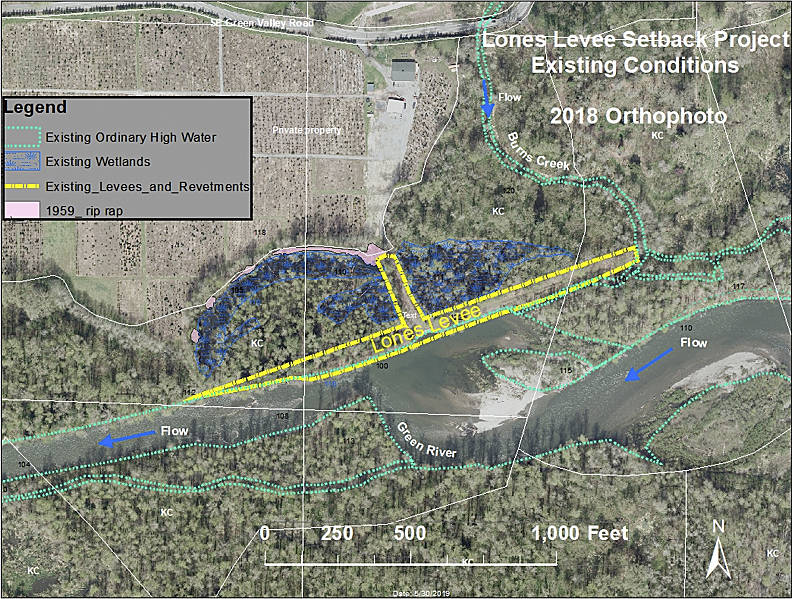Once King County removes the 60-year old Lones levee setback on the Green River just east of Auburn, the Green will rejoin its historic floodplain.
County officials say creating more than 20 acres of salmon habitat in South King County will promote recovery and diversity of chinook salmon and steelhead stocks, help the Puget Sound’s struggling southern resident orca killer whales, and support off-site flood and erosion protection for farmland, private farms, homes and roads.
With, as of ink spilled on Feb. 25, help from The Boeing Co.
That’s the day two environmental nonprofits, Puget Soundkeeper and Waste Action Project, settled with Boeing to address multiple violations of state and federal water-quality and pollution-control standards at its Military Delivery Center (MDC) in Tukwila.
Relative to the MDC, the settlement requires Boeing to install advanced stormwater treatment facilities at the Tukwila site, expand that site’s stormwater monitoring locations to ensure pollutants are properly surveyed and remove PCB-laden flight line materials.
But Boeing has also agreed to pay King County $750,000 to help the Lones Levee Setback and Floodplain Restoration Project.
Founded in 1984, Puget Soundkeeper uses money from its successful settlements to protect, preserve and restore polluted waterways in the region via the Puget Sound Stewardship and Mitigation Fund. Since 1994, the Waste Action Project has focused on the protection Washington state’s waterway, uses funds from settlements to build conservation community in and around waters harmed by pollution.
Here, according to a joint press release, is why the aforementioned non profits took on Boeing.
From the MDC site south of Boeing Field on the east side of the Duwamish River, the Boeing MDC site discharges industrial stormwater to the Duwamish River under Washington state’s Industrial Stormwater General Permit (ISGP).
The ISGP allows Boeing to discharge industrial storm water into the Duwamish River but carefully monitors various pollutants with known harmful health effects on humans and wildlife. Of these, polychlorinated biphenyls, or PCBs, are especially lethal, and known to cause cancer and complications to the immune, reproductive, and nervous system.
According to the release, Department of Ecology records show that the Boeing MDC site had been discharging high levels of PCBs for at least five years without adequate monitoring or control.
According to reports, the Boeing MDC site has, at certain times, discharged up to 36,000 times the Water Quality Standards for Human Health Criteria for PCBs into the Duwamish River, an already-heavily contaminated Superfund site since 2001.
PCB contamination is a key reason for the endangered status of Southern Resident orca whales. PCBs bio-accumulate up the food chain, are stored in fatty tissues, and passed from mother orcas to calves via the mother’s milk, contributing to calf mortality.
What’s more, according to the release, solids found in the catch basins of Boeing’s MDC site were 497 million times over the Sediment Quality Standards for Human Health Criteria. The PCB levels in the sediment from Boeing MDC catch basins are of critical concern, especially during heavy rains that can loosen toxic sediment and cause it to flow directly into the Duwamish River.
The source of the PCBs includes flight line caulking material, runway strip paint, and building materials. Though Boeing has reduced many of these sources by removing these materials, additional abatement is required by today’s settlement.
“We were astounded to find that Boeing was discharging such high levels of PCBs to a river that has an active superfund cleanup underway to abate PCBs, of which they are already responsible for cleaning up,” Katelyn Kinn, Puget Soundkeeper’s Staff Attorney, said in the release.



